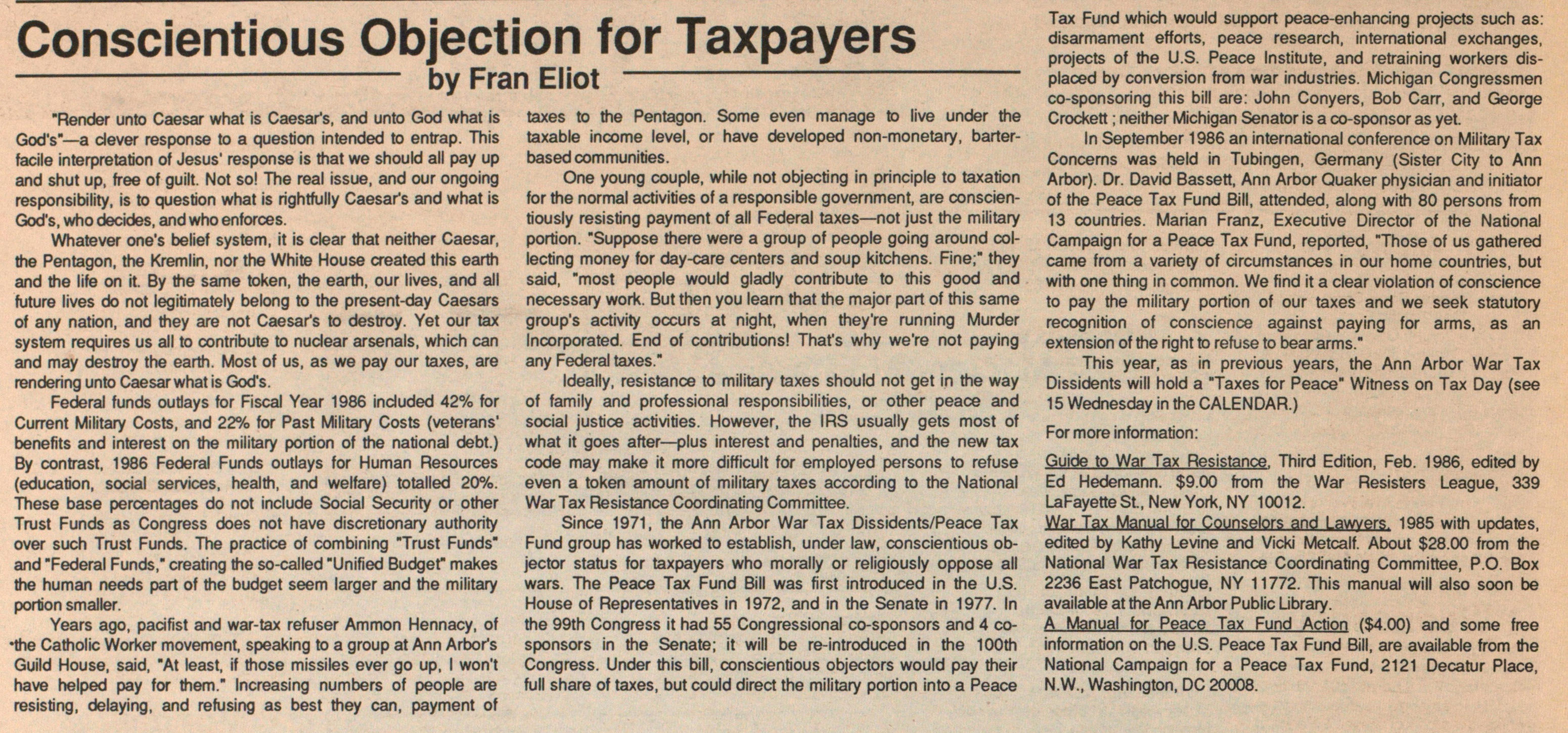Conscientious Objection For Taxpayers

by Fran Eliot
"Render unto Caesar what is Caesar's, and unto God what is God's" - a clever response to a question intended to entrap. This facile interpretation of Jesus' response is that we should all pay up and shut up, free of guilt. Not so! The real issue, and our ongoing responsibility, is to question what is rightfully Caesar's and what is God's, who decides, and who enforces.
Whatever one's belief system, it is clear that neither Caesar, the Pentagon, the Kremlin, nor the White House created this earth and the life on it. By the same token, the earth, our lives, and all future lives do not legitimately belong to the present-day Caesars of any nation, and they are not Caesar's to destroy. Yet our tax system requires us all to contribute to nuclear arsenals, which can and may destroy the earth. Most of us, as we pay our taxes, are rendering unto Caesar what is God's.
Federal funds outlays for Fiscal Year 1986 induded 42% for Current Military Costs, and 22% for Past Military Costs (veterans' benefits and interest on the military portion of the national debt.) By contrast, 1986 Federal Funds outlays for Human Resources (education, social services, health, and welfare) totalled 20%. These base percentages do not include Social Security or other Trust Funds as Congress does not have discretionary authority over such Trust Funds. The practice of combining "Trust Funds" and "Federal Funds," creating the so-called "Unified Budget" makes the human needs part of the budget seem larger and the military portion smaller.
Years ago, pacifist and war-tax refuser Ammon Hennacy, of the Catholic Worker movement, speaking to a group at Ann Arbor's Guild House, said, "At least, if those missiles ever go up, I won't have helped pay for them." Increasing numbers of people are resisting, delaying, and refusing as best they can, payment of taxes to the Pentagon. Some even manage to live under the taxable income level, or have developed non-monetary, barter-based communities.
One young couple, while not objecting in principle to taxation for the normal activities of a responsible government, are conscientiously resisting payment of all Federal taxes - not just the military portion. "Suppose there were a group of people going around collecting money for day-care centers and soup kitchens. Fine;" they said, "most people would gladly contribute to this good and necessary work. But then you learn that the major part of this same group's activity occurs at night, when they're running Murder Incorporated. End of contributions! That's why we're not paying any Federal taxes."
Ideally, resistance to military taxes should not get in the way of family and professional responsibilities, or other peace and social justice activities. However, the IRS usually gets most of what it goes after - plus interest and penalties, and the new tax code may make it more difficult for employed persons to refuse even a token amount of military taxes according to the National War Tax Resistance Coordinating Committee.
Since 1971, the Ann Arbor War Tax Dissidents/Peace Tax Fund group has worked to establish, under law, conscientious objector status for taxpayers who morally or religiously oppose all wars. The Peace Tax Fund Bill was first introduced in ie U.S. House of Representatives in 1972, and in the Senate in 1977. In the 99th Congress it had 55 Congressional co-sponsors and 4 cosponsors in the Senate; it will be re-introduced in the 1OOth Congress. Under this bill, conscientious objectors would pay their full share of taxes, but could direct the military portion into a Peace Tax Fund which would support peace-enhancing projects such as: disarmament efforts, peace research, international exchanges, projects of the U.S. Peace Institute, and retraining workers displaced by conversión from war industries. Michigan Congressmen co-sponsoring this bill are: John Conyers, Bob Carr, and George Crockett; neither Michigan Senator is a co-sponsor as yet.
In September 1986 an international conference on Military Tax Concerns was held in Tubingen, Germany (Sister City to Ann Arbor). Dr. David Bassett, Ann Arbor Quaker physician and initiator of the Peace Tax Fund Bill, attended, along with 80 persons from 13 countries. Manan Franz, Executive Director of the National Campaign for a Peace Tax Fund, reported, "Those of us gathered came from a variety of circumstances in our home countries, but with one thing in common. We find it a clear violation of conscience to pay the military portion of our taxes and we seek statutory recognition of conscience against paying for arms, as an extension of the right to refuse to bear arms."
This year, as in previous years, the Ann Arbor War Tax Dissidents will hold a "Taxes for Peace" Witness on Tax Day (see 15 Wednesday in the CALENDAR.)
For more information:
Guide to War Tax Resistance
Third Edition, Feb. 1986, edited by Ed Hedemann. $9.00 from the War Resisters League, 339 LaFayette St., New York, NY 10012.
War Tax Manual for Counselors and Lawyers
1985 with updates, edited by Kathy Levine and Vicki Metcalf. About $28.00 from the National War Tax Resistance Coordinating Committee, P.O. Box 2236 East Patchogue, NY 11772. This manual will also soon be available at the Ann Arbor Public Library.
A Manual for Peace Tax Fund Action
($4.00) and some free information on the U.S. Peace Tax Fund Bill, are available from the National Campaign for a Peace Tax Fund, 2121 Decatur Place, N.W., Washington, DC 20008.